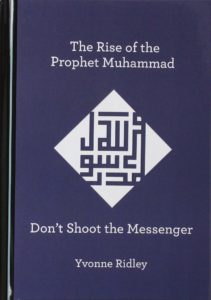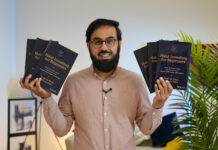The Rise of the Prophet Muhammad: Don’t Shoot the Messenger by Yvonne Ridley is an impassioned defence of the Prophet Muhammad (saw), responding directly to the worst accusations levelled against him by the enemies of Islam, writes Roshan Muhammed Salih.
The book is being released at a time when the vitriol against Islam and Muslims, especially on social media, is at an all-time high. Yes, Islamophobia is now mainstream and as I recently found out, even the leader of a major UK political party is willing to slander a beloved Prophet (saw) to more than 1.6 billion people.
But, as Ridley recounts, this is nothing new. Ever since Islam burst onto the world scene in the seventh century it has been attacked, as has the character of the Prophet. Over the years the Best of Creation has been called everything from a magician and a faker to a warmonger and a peodophile (astaghfirullah).
And there is a simple reason for this – the amazing success of Islam from its inception posed a direct threat to the then-dominant Christian world in religious, economic and military terms. Therefore it was imperative to demonise the religion and its founder to undermine its credibility and to mobilise the fight against it.
Insulting the Prophet
Yvonne Ridley is still most famous for having been kidnapped by the Afghan Taliban shortly after the 9/11 attacks on the United States. Whilst in prison, she promised her captors that she would study Islam which eventually led to her conversion.
At the beginning of the book she describes how she was born in a working class region of the North East of England where, at the time, nobody had even heard of the Prophet. But all that changed as tumultuous events in the Muslim majority world occurred, such as the invasions of Iraq and Afghanistan.
Subscribe to our newsletter and stay updated on the latest news and updates from around the Muslim world!
Now, Ridley writes, everyone has heard of the Prophet. “Even in Stanley, due to the horrific events of 9/11, just about everyone has heard of Islam…but as a result they associate it only with violence, terrorism, olive-skinned people, and men with beards who are reputed to oppress and subjugate their women. It’s a simple but toxic narrative and there are few equipped with the knowledge or desire to challenge it and so the lies persist in the media and beyond.”
Her book is in effect a biography of the Prophet from his early years to his Prophethood. It focuses especially on the aspects of his life that are most critiqued in the West, such as his military campaigns and his marriage to A’isha (ra).
Ridley has deliberately sought out the views of Muhammad’s worst detractors who claimed, among other things, that Islam was a plot concocted by Jews, that it spread through plunder and conquest, and that the Holy Prophet was a sexual predator (astaghfirullah).
She says that Muhammad became the most reviled figure in the West throughout the Middle Ages, and this has only been partially redressed by some more serious scholarship in the twentieth century, which acknowledged that he was one of the most – if not the most -influential and successful human in history.
Ridley writes: “Like their counterparts today in Hyde Park, the early critics had little understanding of Islam, and, perhaps more importantly, they did not want to understand Islam. Their stories were outrageous and baseless, born more out of a fear of the unknown than knowledge. One medieval storyteller claims the reason Muslims refused to eat pork or drink alcohol arose after the Prophet had been trampled to death by a herd of pigs while he was in a drunken state.” (audhu’billah)
Ridley also isn’t afraid to tackle the most sensitive subjects head on, such as the Prophet’s consummation of his marriage to nine-year-old A’isha (ra). Unlike some Muslims who try to claim that A’isha was older than nine to perhaps appease a Western audience, Ridley directly states that the most authentic Muslim view is that she was indeed a young girl. But she then goes on to explain that such marriages were commonplace at the time and warns against judging seventh century Arabia by the standards of the modern secular liberal West.
A hommage to the Prophet
Don’t Shoot the Messenger is a relatively short book of just over 100 pages, so you can read it in a day or two if you really focus. It’s written in an easy, journalistic style for the layman but it’s obvious that Ridley has done a great deal of research at the same time.
The book is aimed at mainly non-Muslim readers who have heard so much nonsense spouted about Islam, or new Muslims that are looking to solidify the foundations of their faith. But most Muslims will find the book stimulating as it will serve as a reminder of how great the Prophet (pbuh) really was, as well as arming us with the ammunition to counter the tired old accusations levelled against him
One thing though, this book is incredibly overpriced at nearly £60 which will almost certainly put the majority off buying it. So unless you’re moneybags I would just wait until it appears in your local library.
Let’s leave the last word to Ridley though because this book is, after all, her tribute to the Best of Creation. “It is little wonder that some Muslims today are bewildered by the adverse reaction to their presence in Europe since it was Islam which dragged the continent out of the Middle Ages and towards enlightenment and the Renaissance.
“The Prophet not only founded a religion but an entire intellectual movement which was to change the world forever in terms of scientific, artistic, mathematical and astrological achievements. Perhaps it is time that Europe acknowledged that contribution and offered friendship and not fear towards this new wave of Muslims.”
You can buy The Rise of the Prophet Muhammad: Don’t Shoot the Messenger here.





















